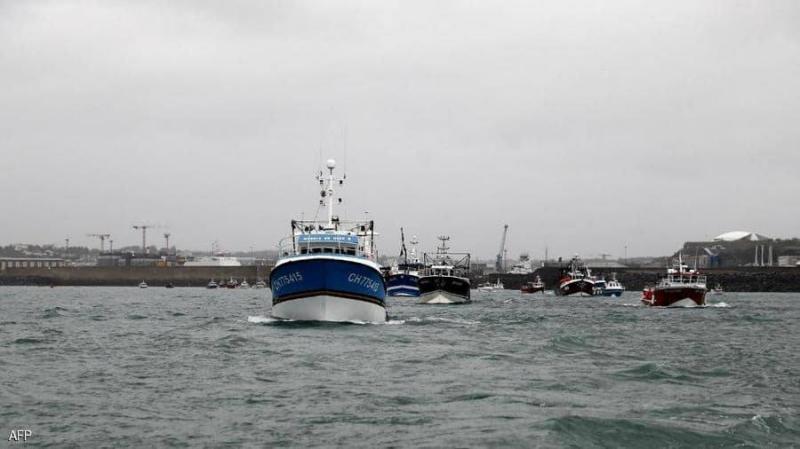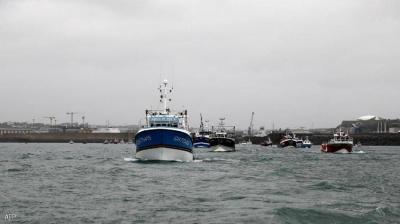Paris and London are exchanging accusations of violating the post-Brexit trade agreement reached late last year regarding "fishing licenses" in British waters. The dispute intensified after France detained a British fishing vessel and London threatened to inspect French fishing boats, marking the latest disagreement between the two sides following the submarine deal.
This new escalation is part of a broader conflict over post-Brexit trade arrangements that could disrupt trade across the English Channel, where fishing has been one of the most challenging issues to resolve over 10 months of negotiations, at times threatening to derail the chances of reaching an agreement.
The agreement stipulates a transitional period until the summer of 2026, during which European fishermen will relinquish 25% of their catch in British waters, equivalent to 650 million euros annually. The agreement also provides for annual renegotiation on this matter. EU fishermen are allowed to access areas between 6 and 12 nautical miles off Britain's coasts, where they traditionally fished, until summer 2026, but they must obtain new licenses.
The crisis began last May when Britain started imposing stricter restrictions on French fishing vessels accessing British fishing areas and complicated licensing procedures, prompting about 100 French boats to gather at St. Helier port in Jersey to register their protest. In response, London sent two Royal Navy patrol vessels to monitor the protest, prompting the French navy to send two boats to the waters surrounding Jersey.
The dispute heightened after France announced initial countermeasures, including tightening controls and imposing a ban on British vessels unloading their catches in French ports starting November if French fishermen do not obtain licenses for these waters. France had already returned a British fishing vessel suspected of fishing in its territorial waters without a license, with its captain facing trial in August 2022, potentially incurring a fine of 75,000 euros, in addition to administrative penalties.
The French government and fishermen claim that London is not adhering to the Brexit agreement by tightening entry conditions for fishermen into British waters. The National Committee for Marine Fishing in France explained that to obtain licenses, vessels must prove to British authorities that they fished in that area during the reference period from 2012 to 2016. They noted, "There is no problem in principle for large vessels equipped with vessel monitoring systems that track locations, but it is more complicated for boats shorter than 12 meters, as geographical positioning is not mandatory for them.” They also indicated that another complication arises when a new boat replaces an old one that has recently joined the fleet since 2016, as it must be proven that the replaced boat was active in British waters.
Following this, London summoned French Ambassador to the UK Catherine Colonna on Friday, an unusual move among allied nations. The ambassador left without commenting after a 20-minute meeting at the Foreign Office. British Foreign Minister Wendy Morton expressed her disappointment with the confrontational tone used by the French government, which she stated does not facilitate a solution to the situation. British Environment Minister George Eustice called for "calm" and "de-escalation," affirming that his government’s door "remains open," while French Prime Minister Jean Castex expressed his "openness to talks" provided London respects its "commitments." However, London deemed the announced French measures as "disproportionate" and warned they would trigger a "measured and considered response."
Amidst these tensions, Macron is set to meet British Prime Minister Boris Johnson in Rome during the G20 summit. Johnson told reporters on his way to Rome, "We will do what is necessary to defend British interests. France is one of our best, oldest, and closest allies, and the ties that bind us are much stronger than the current disruptions in our relationship." Some EU members appear to be taking a cautious stance in facing this dispute, as the German government urged both sides to negotiate.
Political sociologist Saeed Sadiq from the American University stated that Britain is seeking to redefine its status on the international political map in the post-EU phase, while Macron, eyeing a presidential election, is trying to leverage emerging opportunities to bolster his position and waning popularity. Sadiq noted that the crisis would cool down within the framework of commercial and economic gains beneficial to both countries, adding that according to the agreement, "after five and a half years, the matter will be renegotiated if it does not yield sufficient results, giving the treaty a chance for the EU to act."
He clarified that during the meeting between Johnson and Macron, there would be an effort to sidestep French-British problems and attempt to bridge divergent views, but the issue will remain within its economic and strategic context. He remarked that the French escalation is a "reaction" not only to the crisis over ships and licenses but also to the security alliance with the U.S. and Australia, which cost Paris a $40 billion defense contract.




